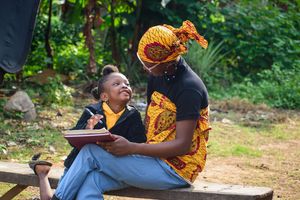
Every beautiful rose comes with thorns.
Boarding school experiences can shape a person profoundly, especially when they start attending before the age of 10. Lifestyle spoke to women, mostly in their late 30s and 40s now, on this challenging experience, offering insight into the complexities of early childhood boarding life. They share their stories of resilience, struggles, and lifelong lessons.
Sally Akinyi's Story: A Struggle for Independence
Sally was thrust into boarding school at the tender age of six, a decision influenced by family circumstances. With her elder brother already in school, she followed him, eager to start her own journey. However, she was sent back home for being too young. It wasn't until a few years later, after her mother’s attempts to find a school were rejected, that Sally finally found a place in a Catholic school in Nyanza, far from the comforts of home.
The early years were tough for Sally. The school served omena (small fish), which she was unfamiliar with and could not stomach. Her reluctance to eat, combined with improper hygiene while washing her food bowls, left her malnourished and struggling. A nun at the school eventually noticed her weight loss and intervened by helping Sally maintain cleaner bowls and regain her appetite.
her visiting aunts suggested enrolling Sally in a Catholic school in Nyanza, and that was when she finally began her education.
"Class One and Two were really hard for me. I would give my food away (mostly omena). When porridge was served, I could still smell the omena, and I don’t drink the porridge,” she recalls.
“Also, I remember when I was in Class 5, my mattress was stolen and I could not bring myself to report the incident. I slept on the springs for a month and when my aunt got wind of it,” she was horrified.
Despite the hardships, Sally credits the early boarding life experience with building her resilience and independence, although it came at a cost. She struggled to form deep relationships later in life, particularly with men, as the early separation from her parents had left her feeling distant and emotionally detached.
When it came time for her own child to start school, Sally was resolute: she would never send him to boarding school. She believes that those few formative years spent together as a family are too precious to lose.
“I can never take my son to boarding school. When my son did class eight, I had to talk him out of it, and thank God we found a good day school. I looked at the few years he has with me and wondered, really do I want him to go away and I want to spend time with him. The way I felt I never spent time with my parents/ knew who they were...I don’t want the same with my children.”
Faith Kutere: Nightmare of Early Boarding School
Faith Kutere was sent to boarding school at the age of eight, a decision her parents made in pursuit of a better education.
“I come from a very remote village. We only had public schools in bad conditions. They were mud-walled ones and we were being taught in our local dialect.”
However, boarding school quickly turned into a nightmare for young Faith. She remembers crying every time she reported to school, tormented by a harsh matron who would bite children on the neck for minor mistakes.
Adding to her woes, Faith battled severe allergies, which caused her significant physical pain, yet her complaints were often dismissed as exaggerated.
“I was also battling allergies and would fall sick occasionally. Every morning during morning preps, I would sneeze and later have chest pains. I was beaten, not once or twice, severally for mistakes I knew nothing about. Unfortunately, my parents thought I was being a crybaby whenever I opened up to them.”
Despite these struggles, Faith excelled in her studies, consistently ranking among the top in her class. However, the emotional scars from the constant bullying and mistreatment have left a lasting impact on her.
Faith, like Sally, is adamant that she will never send her children to boarding school, especially at such a young age. She wants to be present in their lives, nurturing them closely and ensuring they are not subjected to the same torment she endured.
“I want to be close to them, nurture them in the best way possible. I don't want them to be subjected to bullying."
Macy Nthenya's Story: Tears and Resilience
Macy Nthenya began boarding school in Class Five, following her father’s insistence that only boarding could provide a quality education. The isolation and harsh conditions led to daily tears, as she longed to be transferred to the day school where her mother taught. However, her pleas were ignored, and Macy had no choice but to adapt and survive.
Interestingly, despite her negative experience, Macy is now preparing to send her own child to boarding school. The institution he will attend requires boarding from Grade Seven through Form Four, and she believes it will teach him important life skills that regular day schools do not offer. For Macy, the decision is more about the specific school’s holistic approach to education rather than a belief in boarding as a concept.
Joy Kiruki: Fond Memories in a Different Era
In contrast to the previous stories, Joy Kiruki fondly remembers her early years in boarding school. Enrolled at the age of seven, Joy was excited to join her three siblings in a school that promised a blend of discipline and fun. The school held parties, and movie afternoons, and encouraged strong friendships among students. For Joy, boarding school was a positive experience that she cherishes to this day, even staying in touch with fellow alumni through a WhatsApp group.
“It is a WhatsApp group for all alumni, teachers, and the headmaster. There people share their best and worst experiences. It is a safe space. We occasionally have alumni get-togethers too," she says.
Despite these good memories, Joy acknowledges that times have changed. With modern concerns like overcrowding, drugs, and rising social issues in schools, she has decided against sending her own children to boarding school at a young age. She believes that parents play a crucial role in shaping their children during their formative years, a role that cannot be outsourced to a school, no matter how good.
“I schooled in the early 80's and schools were not as crammed as they are now. We didn't hear cases of drugs, lesbianism, etc like we do now. Also, I believe it is important for a parent to be present in a child's life, especially during the formative years before they get to teenage hood,” she says.









